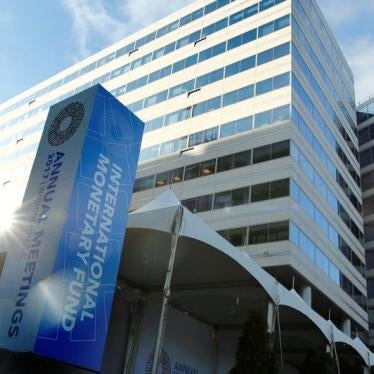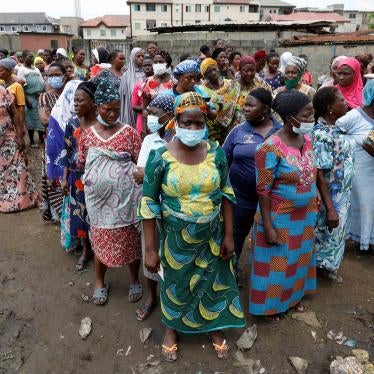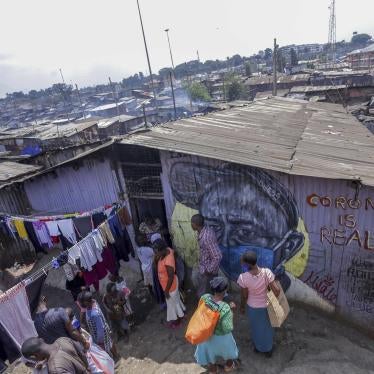IMF Executive Board
700 19th Street NW
Washington, DC 20431
Re: Urgent need for anti-corruption measures in IMF response to COVID-19 crisis
Dear members of the IMF Executive Board,
We hope this letter finds you and your loved ones well and healthy in this unprecedented context.
The COVID-19 outbreak has given rise to one of the most challenging crises the global community has faced in our lifetimes. As the IMF has already recognized, the world has entered a recession as bad or worse than in 2008/9, and its effects are only starting to be felt. In the words of Managing Director Kristalina Georgieva, this is a dual health and economic crisis, and saving lives and protecting livelihoods must go hand in hand.
The IMF is playing a leading role in mitigating the economic impacts of COVID-19 and has committed to put its $1 trillion lending capacity toward that end. More than 90 countries have already requested emergency assistance including through the IMF’s Rapid Credit Facility (RCF), Rapid Financing Instrument (RFI) programs, and Catastrophe Containment and Relief Trust (CCRT). All three of these programs are characterized by their speed and flexibility, as well as limited transparency and conditionality.
We deeply appreciate the scale and speed of the IMF’s response to this crisis through these programs, as well as its support of debt relief and other extraordinary measures. We also understand governments’ urgent need for immediate funding. Nevertheless, we are concerned that unleashing massive amounts of money without including basic transparency and anti-corruption measures risks undoing the significant progress the Fund has made in tackling corruption in recent years. Therefore, we respectfully request urgent action from the Fund in order to make sure that the much needed money it is giving to its member countries is actually used to safeguard public health, save lives, and support livelihoods.
Based on the public information available on the programs the IMF has already approved we have serious concerns that the programs lack even minimal anti-corruption measures. For example, on March 27, the IMF Executive Board approved a US$120.9 million disbursement to the Kyrgyz Republic to address the COVID-19 pandemic. In the publicly available materials related to this decision, we were only able to find one anti-corruption commitment from the government: “To ensure the quality of emergency spending in the health sector, the authorities commit to subject the procurement of urgently needed medical supplies to an ex-post audit by the Audit Chamber, of which the results will be published on the website of the Ministry of Finance.” This single measure is woefully insufficient in light of the governance concerns the IMF highlighted in its July 2019 Article IV review of the country.
In times of crisis such as now, transparent and accountable spending becomes more important—not less so. With the stakes higher than ever, it is critical that people can ensure their governments are using emergency funds to safeguard public health and deliver desperately needed assistance to those hardest hit.
We in no way want to slow down the IMF’s response to the crisis or prevent countries that need the money from receiving it. Rather, we wish to highlight the need for the Fund to establish basic measures to ensure that the money received by countries is used in a transparent and accountable manner to reduce the risks of misuse and corruption.
IMF’s Progress on Anti-Corruption
In recent years, the IMF renewed its commitment to fighting corruption, as part of a broader recognition that resilient economies require good governance, inclusive growth, and strong social protections. After an internal review of the Fund’s track record on anti-corruption, the IMF Executive Board adopted a new framework for enhanced engagement on governance in April 2018. The framework lays out several critical tools for implementing anti-corruption measures and directs the Fund to systematically address anti- corruption concerns in its reporting and lending. Transparency International, Human Rights Watch, and others have found that the IMF has taken this commitment seriously, and anti-corruption has featured more prominently in the Fund’s engagement with a significant number of its member countries. While we would undoubtedly like to see the IMF do more to effectively fight corruption, the steps the IMF has already taken mark a significant advancement when compared to previous years.
While the exigencies of the crisis might appear to diminish the importance of continuing to strengthen the IMF’s commitment to fight corruption, the opposite is true. Corruption risks do not disappear during crises such as this one. In fact, they may be exacerbated by dramatic increases in the amounts and speed of spending, as well as the weakening or breakdown of oversight mechanisms, that allow powerful actors to take advantage of the crisis for their own benefit. For example, the United States Government Accountability Office estimated that up to 16 percent of the aid spent following Hurricane Katrina was lost to improper or fraudulent activities.
Even at this early stage of the pandemic, there are already dozens of media reports of crime and corruption related to COVID-19. There is a high risk that public decisions will be captured or distorted by vested private interests for their own gain, using a range of methods that can include bribery, undisclosed lobbying, and opaque political donations, as well as leveraging situations where there are conflicts of interest or revolving doors between the public and private sectors.
Moreover, the consequences of corruption increase dramatically during a crisis such as this one. The United Nations Office on Drugs and Crime (UNODC) estimates that, on average, 10 to 25 percent of a public contract’s value is lost to corruption. In normal times, this loss creates significant costs for governments, businesses, and citizens. But at a time like this, it can mean the difference between life and death, food on the table or hunger, a roof over one’s head or homelessness.
In addition, the global financial system as a whole remains profoundly vulnerable to the operations of corrupt networks, with significant gaps in anti-money laundering effectiveness in developed countries and major financial centers.
Finally, if the IMF were to be seen as turning a blind eye to corruption now, it would send the message that it is weakening its commitment to these important issues, undermining the reputational gains it has made over the past few years and setting a poor precedent for future lending. Now, more than ever, it is essential that transparency and accountability are maintained.
Recommended Anti-Corruption Measures in Economic Responses to COVID-19
We fully appreciate the need for immediate and flexible funding given the dire economic situation caused by COVID-19, making it difficult for the Fund to conduct lengthy reviews or to require measures that demand time and capacity-building. Nevertheless, we believe there are several measures the IMF can effectively and systematically include in all its emergency funding that will address these limitations while also reducing the risk of mismanagement and corruption of IMF funds.
The IMF can take some of these measures itself or recipient governments can demonstrate compliance with the measures in a timely manner at the time of program approval. Others can only be undertaken after funds are disbursed. We recognize that the IMF generally makes emergency funding available through one-off purchases, which complicates its ability to support reform processes. However, including these measures remains valuable as a signal of the IMF’s commitment to anti-corruption and social protection, and gives civil society a tool to hold their governments accountable. The strong possibility that governments may need to request additional funding from the Fund will also act as an incentive for them to implement the agreed upon measures.
1. Articulate and Demonstrate IMF Commitment to Anti-Corruption
We urge the IMF to highlight the importance of transparency and anti-corruption and underscore that the crisis will not weaken this commitment. The IMF should address both the general need to strengthen anti- corruption systems in member countries and to manage the risks specific to this crisis. All information regarding funding decisions should be published on the IMF website as quickly as possible.
2. Transparency in Public Procurement
Emergencies often demand rushed contracts of significant value, a process that is ripe for abuse. To mitigate risks such as hidden contracts, overpricing, collusion, and bribery, it is essential that transparency, openness, and integrity are preserved and that public purchases and contracting processes are reinforced during this challenging period. At a minimum, recipient countries should be given all possible assistance in order to ensure that:
- Relevant information, including contracts, is published in a timely manner, in an open data format and, wherever possible, on a single platform.
- Companies that bid and/or are awarded with a public contract publish beneficial ownership information in order to help authorities, media, and civil society identify potential conflicts of interest, reduce the opportunities for collusion between linked companies, create fair competition for companies, and ensure full knowledge of who is ultimately benefitting from public funds;
- Fair and open competition among bidders, including both state-owned enterprises and private companies is taking place; where non-competitive bidding takes place for emergency reasons, the use of this approach is strictly limited in both time and scope;
- Where national competition and anti-monopoly agencies exist, they are empowered to monitor market developments in critical sectors in order to prevent collusion between economic actors or practices that result in price speculation.
3. Audits by internal audit bodies and third parties
Recipient governments should ensure that information on how public funds are being disbursed is swiftly and fully available to the internal audit bodies of the ministries or government agencies in charge of responding to the crisis. In addition, they should guarantee that as soon as practically feasible, an external comprehensive audit will take place. Internal and external audits should include inputs from civil society. Priority should be given to critical areas such as health, public procurement, infrastructure, and social security expenditures.
4. Implementation of existing anti-corruption and anti-money laundering frameworks
Where there are gaps in anti-corruption and anti-money laundering frameworks, in particular as regards implementation, the IMF should continue to encourage all member countries, including G20 members and major financial centers, to accelerate measures to tackle them.
We trust the IMF will take these concerns seriously and support its member countries in devoting proper attention, and resources where possible, to support critical transparency and accountability measures.
We thank you in advance for your consideration, and we would welcome the opportunity to discuss this further with you. Please do not hesitate to contact us at mberazategui@transparency.org for any clarifications on these proposals or if you would like to coordinate a conference call with us.
We are looking forward to constructively engaging with you in these exceptional circumstances.
Respectfully,
Delia Ferreira Rubio
Chair
Transparency International
Arvind Ganesan
Director, Business and Human Rights
Human Rights Watch
Simon Taylor
Director and Co-Founder
Global Witness







